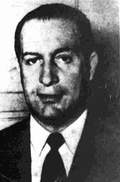Pascoal Ranieri Mazzilli worked as tax collector in São Paulo and then moved to Niterói, where he received education as lawyer (1940). Since 1942 Mazzilli worked for the National Public Treasury as director. In 1945 he affiliated with the Social Democratic Party (Partido Social Democrático, PSD) and was made general secretary for finance in the prefecture of the Federal District (1946-1947). He served as director of the Federal Savings Bank (1947-1948), and then director of the Prefecture Bank of the Federal District (1948-1949). In 1950 Mazzilli was elected federal deputy representing São Paulo (1951-1966) and served as leader of PSD parliamentary group. He was reelected deputy on three other occasions, in 1954, 1958 and 1962. In 1958 Mazzilli was elected President of the Chamber of Deputies (11 Mar 1958 - 24 Feb 1965). Following the resignation of President Jânio da Silva Quadros (25 Aug 1961), the presidency devolved on Mazzilli because Vice President João Belchior Marques Goulart was on a state visit to China. Despite the military opposition against Goulart's return, Mazzilli maintained that he would continue in office until the vice president is installed as a new head of state. By a resolution of 30 Aug 1961 the National Congress rejected unconstitutional claims for declaring the office of president vacant and approved the Additional Act (2 Sep 1961) introducing a parliamentary system. Mazzilli was reelected President of the Chamber of Deputies on 3 Feb 1963 and again assumed the presidency of the Republic [1] when the National Congress declared the office vacant on 2 Apr 1964 after a military coup (31 Mar 1964) that finally deposed Goulart. In revolutionary circumstances Mazzilli found himself powerless as the high-ranked military composed the Supreme Command of the Revolution (Comando Supremo de Revolução), which assumed an authority exceeding that of Mazzilli and promulgated an Institutional Act (9 Apr 1964), later cited as Institutional Act No. 1, and other legislation of the military regime. With the introduction of the two-party system (1965), Mazzilli joined Brazilian Democratic Movement (Movimento Democrático Brasileiro), but he failed to be reelected to the Chamber of Deputies in the 1966 election. [2] |

